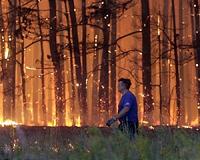| . |  |
. |
Moscow (AFP) Aug 16, 2010 Russia on Monday said it was beating back the country's worst ever wildfires, including one close to a secret nuclear site, as thunderstorms and torrential rain drenched parts of the parched country. The peat and forest fires in the countryside of central Russia have killed more than 50 people and raised concerns about the security of potentially dangerous strategic sites located in the vicinity of the blazes. A huge worry has been fires in a nature reserve close to Russia's main nuclear research centre in Sarov -- a town closed to foreigners as in Soviet times -- but the authorities said they had taken a major step to resolving the crisis. "The situation is stable and controllable. There are no fires on the territory of Sarov," said the head of the emergencies ministry's branch for the Volga region, Igor Panshin. "If the positive dynamic continues then a withdrawal of the contingent in Sarov will begin in the coming week." The emergencies ministry said that the fire, in the district of the village of Popovka, 17 kilometres (10 miles) southeast of Sarov, which had extended to 1,000 hectares (2,470 acres) at the weekend, had been "localised and ringed-in". Nationwide the area affected by wildfires had been reduced by another 8,000 hectares to 45,800 hectares, the ministry said. At the peak of the crisis, an area of almost 200,000 hectares was in flames. Officials also said the situation around Moscow was under control but Russia's tough-talking Prime Minister Vladimir Putin took issue with that line of thought. "The problem is that such control does not suit anyone," the Interfax news agency quoted Putin as saying at a meeting in the town of Kolomna outside Moscow. "Such a situation is unacceptable," he said. Earlier officials showed Putin a technique for flooding peat bogs that have dried out over the years polluting the air, the government said, adding the works to fill up the peat bogs had started a week ago. Officials over the past days sought to downplay the true scale of the disaster and the federal government has yet to confirm that daily mortality rates in Moscow doubled as a result of the heatwave and smog. Temperatures in Moscow were 29 degrees Celsius (84 degress Fahrenheit), well down on the highs of almost 40 degrees seen over the last days, with little sign of the smog from the wildfires that had blanketed the city for days. Moscow was braced for torrential rain and high winds later after tens of thousands in northwest Russia were left without electricity overnight when a storm ripped through the region. The emergencies ministry in the Leningrad region around Russia's second city of Saint Petersburg said almost 100,000 people in 1,500 towns and villages in northwest Russia were left without electricity. The storm, which was also felt in Saint Petersburg, saw high winds and driving rain and felled several trees and even a crane. Train traffic was also affected. But as the fires eased, a new controversy blazed as allegations emerged that Emergencies Minister Sergei Shoigu had personally ordered the blocking of an official website which warned of radioactive dangers from the wildfires. The Roslesozashchita state forest watchdog had warned that hundreds of hectares of land had burned in the Bryansk region of western Russia, an area still contaminated by the 1986 Chernobyl nuclear disaster. Deputy director of the watchdog, Alexei Bobrinksy, told AFP the website has not been working since Friday afternoon. The Kommersant daily said the company hosting the site, Multikhost, had been telephoned at the weekend by the authorities and ordered to block the website. However the company insisted it had not blocked the site. The paper said that Shoigu had personally ordered that the site was "sorted out" as it had published "false information about the fires in the Bryansk region." The fires and heatwave have triggered a major crisis in Russia affecting nearly all areas of life, in particular the agriculture industry which has seen one quarter of Russian crops destroyed. Russia at the weekend implemented a ban on the export of grain which has proved highly controversial and forced up world wheat prices to two-year highs.
Share This Article With Planet Earth
Related Links Forest and Wild Fires - News, Science and Technology
 Firefighters struggle in vain near Russian nuclear centre
Firefighters struggle in vain near Russian nuclear centreTokushevo, Russia (AFP) Aug 12, 2010 Overwhelmed and under-equipped, firefighters struggled in vain against spreading wildfires in the forest of Tokushevo, 50 kilometres (30 miles) from Russia's top nuclear research centre. "We have no control (over the fires), now all we can do is get ourselves killed," said firefighter Vasily Filin, who like his colleagues was battling the blazes without the benefit of any protective equipmen ... read more |
|
| The content herein, unless otherwise known to be public domain, are Copyright 1995-2010 - SpaceDaily. AFP and UPI Wire Stories are copyright Agence France-Presse and United Press International. ESA Portal Reports are copyright European Space Agency. All NASA sourced material is public domain. Additional copyrights may apply in whole or part to other bona fide parties. Advertising does not imply endorsement,agreement or approval of any opinions, statements or information provided by SpaceDaily on any Web page published or hosted by SpaceDaily. Privacy Statement |